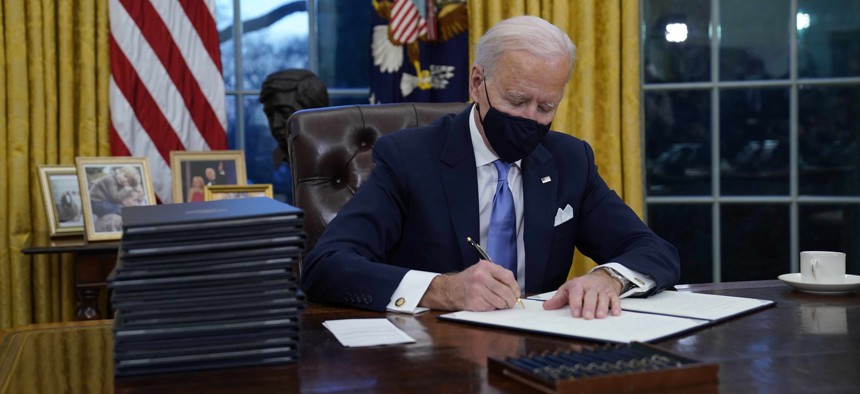Biden Moves to Rejoin Paris Climate Pact, Halt Keystone XL Pipeline

President Joe Biden signs his first executive orders in the Oval Office of the White House on Wednesday, Jan. 20, 2021, in Washington. AP Photo/Evan Vucci
After he was sworn into office on Wednesday, President Biden signed a slate of executive actions, including measures to begin reversing Trump era environmental policies.
Newly sworn-in President Joe Biden on Wednesday took immediate steps to reenter the U.S. into an international climate pact and to block the controversial Keystone XL oil pipeline project, along with other executive actions to begin erasing his predecessor's mark on the nation's environmental policies.
Biden's administration announced the environmental measures alongside a raft of other day-one orders and directives spanning a range of policy areas, including racial equity, immigration and the coronavirus pandemic response. "I thought there's no time to wait. Get to work immediately," Biden said in the Oval Office, following his inauguration ceremony earlier in the day.
"There's no time to start like today," he added, after signing several executive actions, including one to begin the process of rejoining the Paris climate agreement.
Environmental groups generally praised Biden's initial measures. “This is swift and decisive action. It makes the United States once more part of the global climate solution—not the problem," said Mitchell Bernard, president of the Natural Resources Defense Council.
Republicans bristled.
“A president who promised to help the American people should not start off his administration by killing a project in which thousands are employed,” Louisiana Sen. Bill Cassidy said, referring to the pipeline.
Sen. John Barrasso, of Wyoming, said that returning to the Paris agreement would raise Americans’ energy costs without solving climate change. "The Biden administration will set unworkable targets for the United States while China and Russia can continue with business as usual," Barrasso added.
The reactions were a preview of disagreements likely to unfold over Biden's term, as he and progressives attempt to carry out an ambitious climate and environmental agenda, parts of which are all but certain to draw stiff opposition from Republicans—particularly those from states with economies that depend on coal, oil and gas production.
Biden's climate and energy priorities differ sharply from outgoing President Donald Trump's. The new president has described climate change as an existential threat, has pledged to embrace clean energy and move the nation toward net-zero carbon emissions by 2050.
Trump was a strong proponent of coal, expanded oil and gas drilling and other fossil fuel-related industries. He questioned climate science, mounted an aggressive effort to slash environmental regulations and withdrew the U.S. from the Paris accord.
The U.S. formally entered the Paris climate agreement in 2016, during the Obama administration and withdrew from it late last year. Nearly 200 countries have signed onto the pact, which involves nations setting voluntary goals for reducing emissions. Trump argued the deal would hurt the U.S. economically.
Biden said his administration would give notice to the United Nations on Wednesday that it wants to rejoin the agreement, a process that will take about 30 days to complete.
Sen. Steve Daines, a Montana Republican opposed to the climate pact, said he and other GOP senators would introduce a resolution calling on Biden to submit the Paris agreement to the Senate for review.
The Keystone XL pipeline has been mired in controversy since it was proposed in 2008. Opponents say it poses environmental risks and would lead to worse emissions. Supporters counter that pipelines are a relatively safe way to move oil and that the project would help decrease U.S. dependence on other parts of the world for fuel.
As planned, the pipeline would connect Canada's Alberta tar sands region with the U.S. Gulf Coast. The Obama administration rejected the pipeline. The Trump administration granted approvals to allow it.
Canada-based TC Energy Corp., the company backing the Keystone project, said it was disappointed with Biden's revocation of the presidential permit Trump issued for the pipeline, but that the decision was expected. The company said that it would assess the decision's implications and consider its options, but that for now, "advancement of the project will be suspended."
Biden also directed the Interior Department to review the boundaries of national monuments that Trump took executive action to downsize, including the sprawling red rock landscapes of Grand Staircase-Escalante and Bears Ears in Utah.
The changes Trump made to those monuments opened protected areas to mining, livestock grazing and other activities, like expanded motorized vehicle use and clearing vegetation.
Additionally, Biden instructed Interior to place a temporary moratorium on all oil and natural gas leasing in the Arctic National Wildlife Refuge. Part of the refuge on Alaska's north coast, which provides habitat to polar bears, caribou and other wildlife, was opened to drilling under a provision Republicans inserted into the 2017 law overhauling the nation's tax code.
The Trump administration rushed to issue drilling leases there during Trump's final days in office. But a lease sale attracted limited interest.
Biden ordered agencies to review a range of other regulations and executive actions taken over the past four years as well.
The U.S. Conference of Mayors applauded Biden's actions on climate and the environment.
“The rejection of science that has guided our nation’s posture regarding climate change over the last four years has left mayors and local leaders to pick up a discarded mantle of environmental leadership," Louisville, Kentucky Mayor Greg Fischer, who is the current president of the conference said in a statement.
“America’s mayors welcome the federal government back to the climate change fight," he added.
PREVIOUSLY on Route Fifty
Bill Lucia is a senior reporter for Route Fifty and is based in Olympia, Washington.
NEXT STORY: Some Health Care Workers Refuse Covid Vaccine






